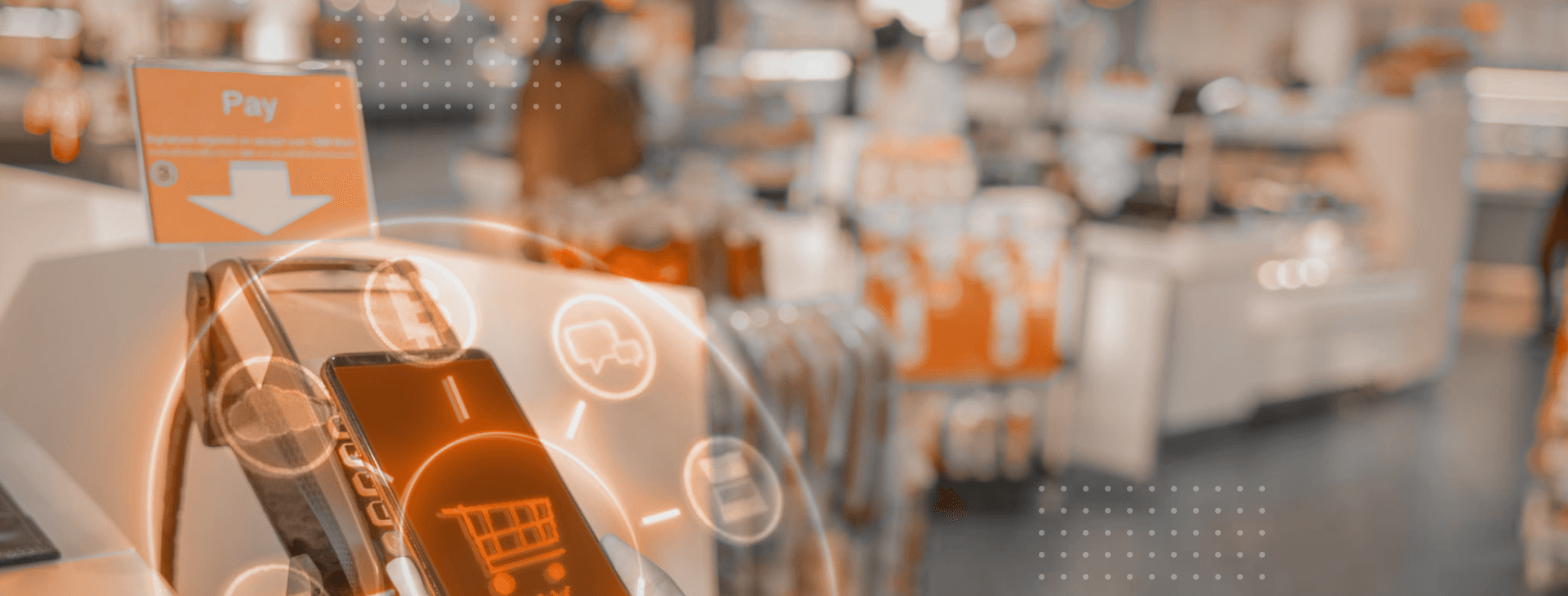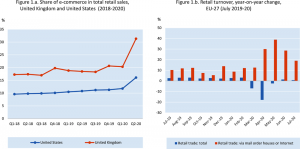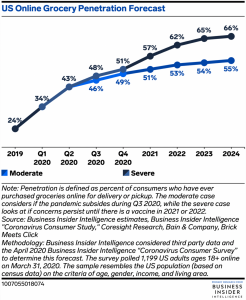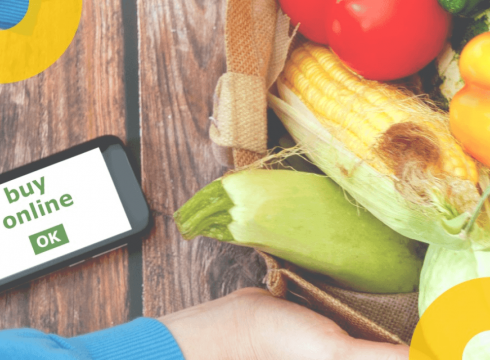Here is How the Store of the Future Will Operate

The last standing monument of the previous millennia, “the conventional retail store”, is going through the inevitable. The digital world has been swallowing up everything, but nobody expected the retail and the grocery industries to go through such an immense shift toward the digital. Like every other front, the COVID-19 pandemic has been a leading force for retail digitalization, and when we take a look back at the last year, we see a race for adaptation in a chaotic environment.

Source: OECD
According to the statistics by OECD, the pandemic has made e-commerce in the retail industry skyrocket in almost every country. The UK was one of the fastest countries to adopt the new way of shopping, and projections show us that we won’t see a reverse change in the choices of consumers in a post-pandemic world. Business Insider’s projections show us that, even in the US, where online grocery shopping adoption was slower than in the EU, online shopping will be the main revenue maker in the future for the FMCG retailers. At least, that’s what the experts and their surveys project. According to the Grability, 70-80% of U.S. consumers are predicted to do their food shopping online.

Source: Business Insider
Of course, grocery stores of the future will not be 100% online. Still, it would be too naive to expect the physical stores to remain the same. Technology is here to maximise convenience for everybody, and all businesses have to do is to act a little faster than before. In this article, we are going to share what the experts imagine the store of the future will be like, and how businesses can adapt quickly.
Say Good-Bye to Megastores
Although the customer of the previous decades enjoyed trips to huge supermarkets, today, with the younger and more time-wary consumers coming under the spotlight, spending long days in stores is becoming less and less preferrable. Plus, when you consider the rising proportion of online grocery orders, it is only reasonable that this will lead to the new, hybrid megastore of the future. According to experts, supermarkets will have less conventional shopping space and more space and resources dedicated to pick-up and order delivery. The surveys state that 80% of the shoppers are already ready for hybrid retail stores. One of the biggest challenges that businesses face is tracking their inventory. Thankfully, with a unified system like Ubimecs Q-Commerce Module, businesses can have multi-store tracking capabilities. Our Ubimecs Q-Commerce module handles the online retail process from the beginning to the end; both for the stores and the shoppers.
Self-Checkout is Going Mainstream
For more than a decade, the majority of the supermarket chains have been slowly transitioning towards self-checkout and cashier-less stores. For the cashier-less store model, new and experimental concepts have been emerging, especially in the eastern markets. One of the easiest ways to go cashier-less is the pick-up model, where the customers place orders online, and pick up their orders from the store. The model saves the customer a great deal of time, it is more budget-friendly than the home delivery model and involves fewer employees which will always improve business profit. Our Ubimecs Q-Commerce module lets your business adapt the store pick-up business model quickly; all you have to do is build the operation and dedicate a corner to order pick-ups in your store.
Know What Your Customer Likes
Everybody knows that different customer profiles demand different products from retail stores; offering everything in the same store usually means spending more budget and having a larger workforce. With today’s technology, businesses can have countless data gathering tools, and loyalty programs play a big role in that arena. Many brands aim to build their loyalty programs to work seamlessly with their personalization strategies, but we have an even better idea: using every piece of data for all of your strategies. This includes determining the future of your loyalty programs, on-point personalized offerings, and what to sell in various stores and warehouses. Our module’s data analysis capabilities mean you can join the new-age retail game one step ahead.
Last-Mile Delivery is Here to Stay
One of the main reasons we have seen such a quick movement towards online service in the FMCG industry has undoubtedly been express grocery delivery options. First, industry leaders like Walmart stepped into the new and highly conventional arena. Today, everybody else is trying to follow the trend. The idea of groceries being delivered to your door in under two hours and the underlying sense of “freshness” has convinced customers of the credibility of the delivery model. Yes, building a fully-functioning system with couriers, mini-stores, and new employees is highly challenging, but we have some ideas. We are constantly updating our blog with articles on new solutions for express grocery delivery models, and you can read one of our most-useful articles here. Of course, there are many answers to the problem, but all of them require an omnichannel approach. All of our platforms and modules, including the Ubimecs Q-Commerce Module and the Ubimecs Express E-Commerce Module, have been designed with an omnichannel-first consciousness.




